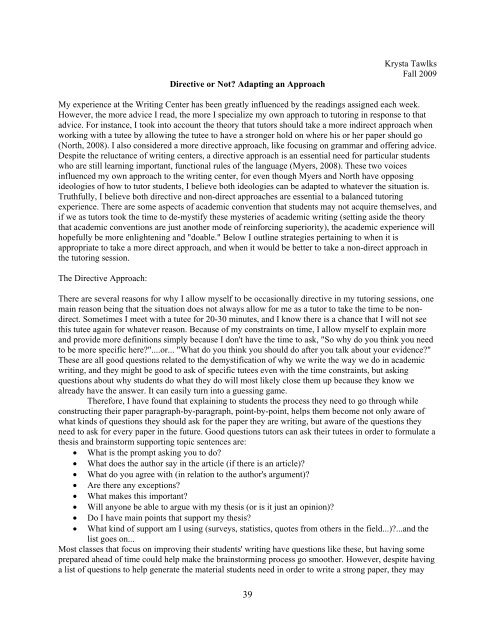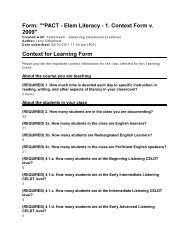The Tutoring Book - California State University, Sacramento
The Tutoring Book - California State University, Sacramento
The Tutoring Book - California State University, Sacramento
You also want an ePaper? Increase the reach of your titles
YUMPU automatically turns print PDFs into web optimized ePapers that Google loves.
Directive or Not? Adapting an Approach<br />
39<br />
Krysta Tawlks<br />
Fall 2009<br />
My experience at the Writing Center has been greatly influenced by the readings assigned each week.<br />
However, the more advice I read, the more I specialize my own approach to tutoring in response to that<br />
advice. For instance, I took into account the theory that tutors should take a more indirect approach when<br />
working with a tutee by allowing the tutee to have a stronger hold on where his or her paper should go<br />
(North, 2008). I also considered a more directive approach, like focusing on grammar and offering advice.<br />
Despite the reluctance of writing centers, a directive approach is an essential need for particular students<br />
who are still learning important, functional rules of the language (Myers, 2008). <strong>The</strong>se two voices<br />
influenced my own approach to the writing center, for even though Myers and North have opposing<br />
ideologies of how to tutor students, I believe both ideologies can be adapted to whatever the situation is.<br />
Truthfully, I believe both directive and non-direct approaches are essential to a balanced tutoring<br />
experience. <strong>The</strong>re are some aspects of academic convention that students may not acquire themselves, and<br />
if we as tutors took the time to de-mystify these mysteries of academic writing (setting aside the theory<br />
that academic conventions are just another mode of reinforcing superiority), the academic experience will<br />
hopefully be more enlightening and "doable." Below I outline strategies pertaining to when it is<br />
appropriate to take a more direct approach, and when it would be better to take a non-direct approach in<br />
the tutoring session.<br />
<strong>The</strong> Directive Approach:<br />
<strong>The</strong>re are several reasons for why I allow myself to be occasionally directive in my tutoring sessions, one<br />
main reason being that the situation does not always allow for me as a tutor to take the time to be nondirect.<br />
Sometimes I meet with a tutee for 20-30 minutes, and I know there is a chance that I will not see<br />
this tutee again for whatever reason. Because of my constraints on time, I allow myself to explain more<br />
and provide more definitions simply because I don't have the time to ask, "So why do you think you need<br />
to be more specific here?"....or... "What do you think you should do after you talk about your evidence?"<br />
<strong>The</strong>se are all good questions related to the demystification of why we write the way we do in academic<br />
writing, and they might be good to ask of specific tutees even with the time constraints, but asking<br />
questions about why students do what they do will most likely close them up because they know we<br />
already have the answer. It can easily turn into a guessing game.<br />
<strong>The</strong>refore, I have found that explaining to students the process they need to go through while<br />
constructing their paper paragraph-by-paragraph, point-by-point, helps them become not only aware of<br />
what kinds of questions they should ask for the paper they are writing, but aware of the questions they<br />
need to ask for every paper in the future. Good questions tutors can ask their tutees in order to formulate a<br />
thesis and brainstorm supporting topic sentences are:<br />
• What is the prompt asking you to do?<br />
• What does the author say in the article (if there is an article)?<br />
• What do you agree with (in relation to the author's argument)?<br />
• Are there any exceptions?<br />
• What makes this important?<br />
• Will anyone be able to argue with my thesis (or is it just an opinion)?<br />
• Do I have main points that support my thesis?<br />
• What kind of support am I using (surveys, statistics, quotes from others in the field...)?...and the<br />
list goes on...<br />
Most classes that focus on improving their students' writing have questions like these, but having some<br />
prepared ahead of time could help make the brainstorming process go smoother. However, despite having<br />
a list of questions to help generate the material students need in order to write a strong paper, they may

















